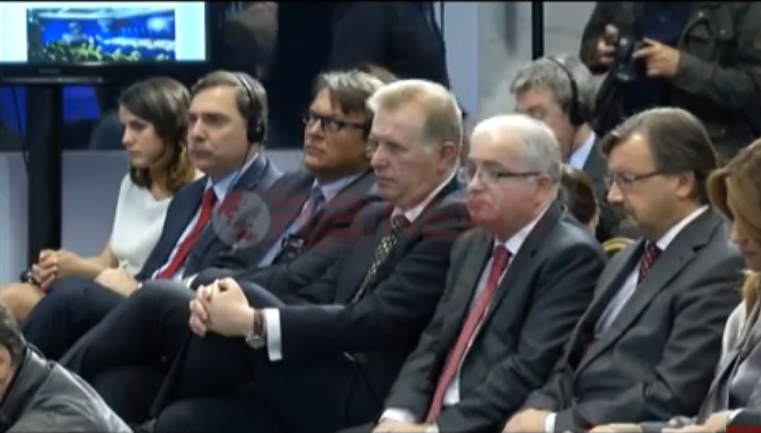May 23, 2014 – July 25, 2014
Albanian Policy Center
“TRANSATLANTIC COOPERATION FOR PEACE AND SECURITY IN THE BALKANS: AN ALBANIAN AGENDA ON EU AND NATO INTEGRATION”
09:00 – 09:30 Registration of the participants
09:30 – 09:40 Opening remarks
Edith Harxhi, Executive Director of “Albanian Policy Center”
09:40 – 11:10 Session 1:
“Albania’s NATO Membership, Securing Balkan Stability and EU Integration”
Speakers: Mr. Jonathan Moore,Director of South-Central European Affairs, State Department
Mr. Lulzim Basha, Chairman of the Democratic Party of the Republic of Albania, Mayor of Tirana
Ms. Edita Tahiri, Deputy Prime Minister of the Republic of Kosova, Head of the Kosova- Serbia dialogue;
Mr. Pandeli Majko, Member of the Albanian Parliament, Former Prime Minister of the Republic of Albania and Former Minister of Defence.
Moderator: Edith Harxhi, Executive Director of Albanian Policy Center, Former Deputy Foreign Minister of the Republic of Albania
5 years of NATO membership for Albania and Croatia. Challenges and Achievements! Was 2009 NATO enlargement a success story? Is the Balkans more secure and have external and internal threats in the region diminished? While analysing the achievements of post NATO accession for Croatia, what is the impact of NATO membership in Albania’s democracy, development and its aspirations for EU membership? Where is Albanian heading up too? Is it becoming more democratic or more autocratic?
How does the independence of Kosovo, its recognition by 106 countries, and the ongoing dialogue between Kosovo and Serbia influence the future of the Balkans after years of conflicts and insecurity? Can there be a new scenario/political quest for Macedonia, which due to its name dispute continues being with one foot in the alliance even 5 years after the official invitation to join NATO?
Is Montenegro, Bosnia, Kosovo ready for future accession and how would Serbia react after the Crimean crisis? Will enlargement go east?
11:10-11:30 Coffee Break
11:30 – 13:00 Session 2
“Albanian Democracy towards Regional Cooperation and EU Accession”
Speakers:Mr. Clive Rumbold, Head of Political Office, European Delegation to the Republic of Albania
Ms. Teuta Arifi, Mayor of Tetova, Former Deputy Prime Minister and Minister of Integration of Macedonia;
Ms. Arta Dade, Chair of the Foreign Affairs Committee of the Albanian Parliament;
Ms. Majlinda Bregu, Chair of the European Integration Committee in the Albanian Parliament, Former Minister of Integration of the Republic of Albania;
Mr. Majlind Lazimi, Deputy Minister of Integration of the Republic of Albania;
Moderator:Ms. Ilda Zhulali, Former Director General of European Affairs in the Ministry of Foreign Affairs of the Republic of Albania
As of 1st of July 2013, Croatia has joined EU. Montenegro is already negotiating chapters at great speed and looks like it would be next in line for membership. Serbia managed to grab the opening date for negotiations after showing signs of truce and letting Kosovo free; Macedonia and Bosnia stagnating. Albania continues knocking on EU’s door but will it remain for long in the “waiting room”.
The European Commission’s October 2013 recommendation for the candidate status on Albania when presented to the member states for final endorsement, was benchmark-free. Despite high expectations, the decision was not the desired one. The member states underlined that more credible efforts were necessary.
As June’s Council meeting is approaching, the European Commission has to draft a new progress report backing Albania’s bid for candidate status. While in the waiting room, has Albania lowered its EU ambition? What is the pace of reforms and how does the current political climate favour the status decision this coming June? Will Albania join the “frontrunners” lane, or accommodate itself in the waiting room? What is the key to opening the EU doors? Are extremist forces in EU member states a real threat to Albania’s EU perspective? Will the four remaining benchmarks for accession negotiations be enough for the next step?
Elections to the European Parliament are to be held between 22nd and 25th of May, which makes lobbying more difficult in practical terms. Enlargement does not seem to be particularly in fashion these days, and seems that the Western Balkans agenda is moving from “the unfinished business” to “any other business”, with other challenging developments in the outskirts of Europe. Will Macedonia speed up the name talks with Greece and continue negotiating the chapters afters so many years of neighbourly disputes? Is EU accession more difficult than NATO accession? Would democratic difficulties and political hindrances, EU enlargement fatigue if any, make the countries in the Balkans (especially Albanians) look more towards transatlantic relations and have more trust in US?
13:00 – 15:00 Lunch and networking.
15:00 – 16:30 Session 3
“Similar Economic Issues, yet Different Economic Outcomes in the Balkans. A Liberal Market Approach to Economic Prosperity and EU Integration for Albanians”
Speakers:
Ms. Mimoza Kusari-Lila,Mayor of Gjakova, Former Deputy Prime Minister and Minister of Trade and Economy of the Republic of Kosova
Mr. Arben Malaj,Former Minister of Finance of the Republic of Albania;
Mr. Florjon Mima,Member of Parliament, Former Minister of Economy, Trade and Energy of the Republic of Albania;
Prof. Adrian Civici,President of European University of Tirana; Professor of economy;
Prof. Abdulmenaf Bexheti,Pro-rector of South East-European University, Republic of Macedonia; Member of the Academy of Science of Macedonia;
Moderator: Mr. Besart Kadia,Director of Foundation for Economic Freedom, European University of Tirana
Do the Balkan countries face similar economic and developmental issues like: endemic corruption, anaemic rule of law, lack of well-established and effective institutions or financing gaps?
If so, do different Balkan countries have different perspectives on facing these issues? Do similar issues warrant similar solutions? What solutions have been, and are, being contemplated and implemented in Kosovo, Macedonia and elsewhere in the region? Which school of economic theory seems more advantageous in the Balkan economies, liberal vs. statist? Is a liberal market approach the best answer to the economic ailments of these countries?
What answers did Albania provide to these issues in recent years? What seems to be the perspective now? What are the prospects of the Albanian economy after enjoying eight years of “top of the charts” growth among the Balkan economies?
How has NATO membership affected the economy of the countries in the region? Specifically, how has it affected Albania’s FDI inflows and the economy in general?
Are economic reforms and growth a precondition to further integration in the EU? On the other hand, will further integration indeed increase the pace of economic reforms and growth? After a financial crisis followed by years of an economic crisis in the EU countries, should the Balkans be more sceptical of closer economic ties to the EU? Has the CEFTA agreement benefitted the economies of the region? Should the economies of the region take steps beyond CEFTA to strengthen economic integration? Should Albania, Kosovo, Macedonia and Montenegro take steps beyond CEFTA and EU integration, to strengthen their economic cooperation?
16:30 – 17:00 Coffee Break
17:00 – 18:30 Session 4
“Youth and a New Political Elite in making”
Speakers: Rudina Hajdari, (Junior Fellow at the House Committee on Foreign Affairs in the U.S. Congress)
Endrit Brahimllari (Chairman of the Youth Forum of LSI Youth Forum)
Maria Myridinas (Deputy Chair of the Youth Forum of the Socialist Party of Albania)
Henris Balliu (Lecturer at Faculty of Justice, University of Tirana)
Reila Bozdo (Lecturer at Faculty of Economy, University of Tirana)
PD Youth Forum
Moderator: Elton Rukaj (Lecturer at European University of Tirana)
In every country of the world, either democratic or less democratic, the Youth (Youngster or the Juveniles) are the avant-gardes of different political and social elites. Their role as decision makers might not be taken seriously at certain times during political rotation but their voice, desires, inspiration, intuition and their vision of what the future should look like, cannot be neglected. Those governments that disregard or disfranchise this group run the risk to be washed aside by the forces of world globalization. Every politician or decision maker was once at our age and full with hope and desire to change or do something good for the country. Back in the days during the 90s, the youth was fighting for Freedom, Equality and Justice dictated by certain conditions, and as such it would be of great importance to find out what is that our youth is fighting for? Are philosophical concepts like Justice, Freedom and Democracy fulfilled nowadays? Do we live in conservative societies? Do we like our current political scene? If I were to change something in the way my country’s affairs go today and the way my country is leaded, what should I change? Are we going towards autocratic regimes and how much space we have in our societies? Are we represented and how do we want to be represented? Do we feel the need of more social media politics or the Balkans cannot embrace for many more years the new ideas of high-tech politics? Do I vote and endure the consequences, or I am already enduring the consequences of my vote and what will be my country’s fate? If I do consider myself a European, how should I be treated and if I am not considered a European, then where is my country going? How should the new political elite look like in the future and what are the basic values they need to rely on?
Albania a return to 1991 democratic values…a new leadership or new political elite in making…
Philosophical pillars
Conservatives believe in personal responsibility, limited government, free markets, individual liberty, family and cultural values and a strong national defence. Believe the role of government should be to provide people the freedom necessary to pursue their own goals. Conservative policies generally emphasize empowerment of the individual to solve problems.
Social Liberals believe in government action to achieve equal opportunity and equality for all. It is the duty of the government to alleviate social ills and to protect civil liberties and individual and human rights. Believe the role of the government should be to guarantee that no one is in need. Liberal policies generally emphasize the need for the government to solve problems.

